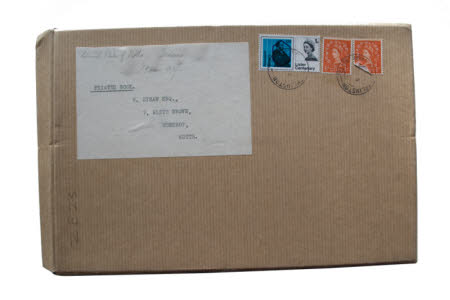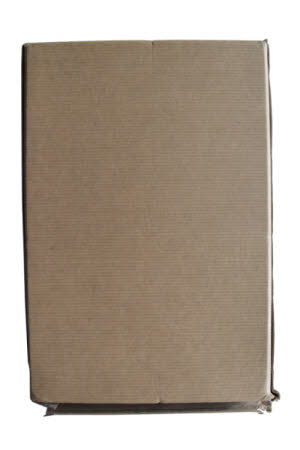Envelope
Category
Books
Date
Unknown
Materials
card
Order this imageCollection
Mr Straw's House, Nottinghamshire
NT 3168027.2
Summary
Original postage packaging for a book. Brown cardboard envelope plain on the back with a white address sticker and stamps on front side. 'PRINTED BOOK. W. STRAW ESQ., 7, BLYTH GROVE, WORKSOP, NOTTS.' above the address on the sticker handwritten in pencil by William Jnr. 'Church Plate of Notts. Jeavons 1965 30 / -'. The first of the three stamps is a large oblong and has the value of '1s' and has the head of Queen Elizabeth II facing left in black and white on the right side with 'Lister Centenary' beneath to the left of this a blue background with black print image of Lister with 'Antiseptic Surgery' written vertically on his left. There is a partial round black postal mark covering the lower half, '.....GTON - S.....'. The other two stamps are the usual size and are the same. Orange background with Queen Elizabeth II looking left surrounded by flowers and '1/2d. POSTAGE REVENUE 1/2d.' underneath. These are stamped over by a black circular postal mark, '...LINGTON - STON.....'. The envelope contains the book 'Church plate of Nottinghamshire :. Diocese of Southwell, 1569-1850' by Sidney Aston Jeavons (record 3168027). Joseph Lister, 1st Baron Lister, OM PC PRS (5 April 1827 – 10 February 1912), known between 1883 and 1897 as Sir Joseph Lister, Bt., was a British surgeon and a pioneer of antiseptic surgery. By applying Louis Pasteur's advances in microbiology, he promoted the idea of sterile portable ports while working at the Glasgow Royal Infirmary. Lister successfully introduced carbolic acid (now known as phenol) to sterilise surgical instruments and to clean wounds, which led to a reduction in post-operative infections and made surgery safer for patients, distinguishing himself as the "father of modern surgery".
Provenance
Straw collection bequeathed to The National Trust on the death in 1990 of William Straw.

